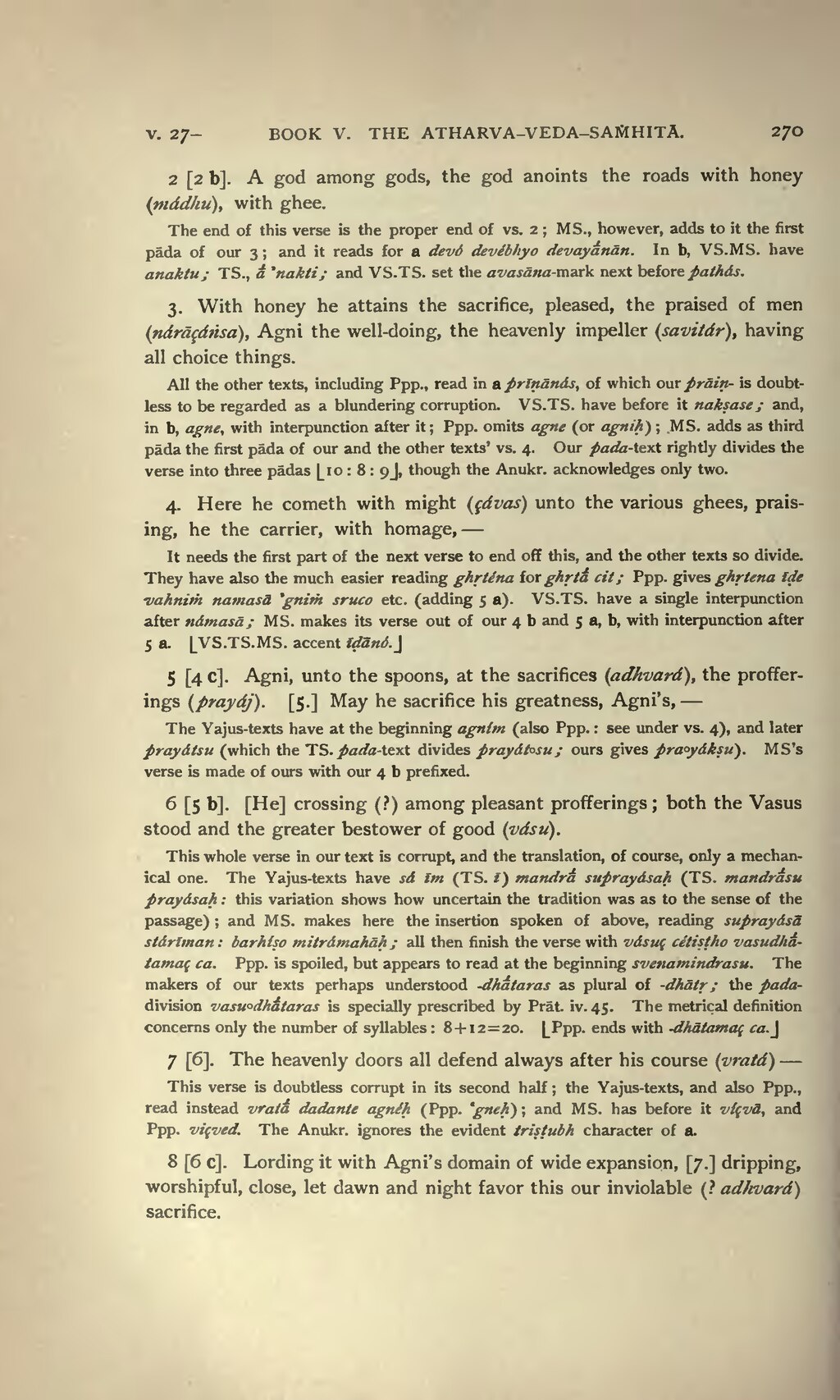2 [2 b]. A god among gods, the god anoints the roads with honey (mádhu), with ghee.
The end of this verse is the proper end of vs. 2; MS., however, adds to it the first pāda of our 3; and it reads for a devó devébhyo devayā́nān. In b, VS. MS. have anaktu; TS., ā́ ’nakti; and VS.TS. set the avāsana-mark next before pathás.
3. With honey he attains the sacrifice, pleased, the praised of men (nárāçáṅsa), Agni the well-doing, the heavenly impeller (savitár), having all choice things.
All the other texts, including Ppp., read in a prīṇānás, of which our prāiṇ- is doubtless to be regarded as a blundering corruption. VS.TS. have before it nakṣase; and, in b, agne, with interpunction after it; Ppp. omits agne (or agniḥ); MS. adds as third pāda the first pāda of our and the other texts' vs. 4. Our pāda-text rightly divides the verse into three pādas ⌊10: 8: 9⌋, though the Anukr. acknowledges only two.
4. Here he cometh with might (çávas) unto the various ghees, praising, he the carrier, with homage,—
It needs the first part of the next verse to end off this, and the other texts so divide. They have also the much easier reading ghṛténa for ghṛtā́ cit; Ppp. gives ghṛtena īḍe vahniṁ námasā ’gniṁ sruco etc. (adding 5 a). VS.TS. have a single interpunction after námasā; MS. makes its verse out of our 4 b and 5 a, b, with interpunction after 5 a. ⌊VS.TS.MS. accent īḍānó.⌋
5 [4 c]. Agni, unto the spoons, at the sacrifices (adhvará), the profferings (prayáj). [5.] May he sacrifice his greatness, Agni's,—
The Yajus-texts have at the beginning agním (also Ppp.: see under vs. 4), and later prayátsu (which the TS. pada-text divides prayát॰su; ours gives pra॰yákṣu). MS's verse is made of ours with our 4 b prefixed.
6 [5 b]. [He] crossing (?) among pleasant profferings; both the Vasus stood and the greater bestower of good (vásu).
This whole verse in our text is corrupt, and the translation, of course, only a mechanical one. The Yajus-texts have sá īm (TS. ī) mandrā́ suprayásaḥ (TS. mandrā́su prayásaḥ: this variation shows how uncertain the tradition was as to the sense of the passage); and MS. makes here the insertion spoken of above, reading suprayásā stárīman: barhíṣo mitrámahāḥ; all then finish the verse with vásuç cétiṣṭho vasudhā́tamaç ca. Ppp. is spoiled, but appears to read at the beginning svenamindrasu. The makers of our texts perhaps understood -dhā́taras as plural of -dhātṛ; the pada-division vasu॰dhā́taras is specially prescribed by Prāt. iv. 45. The metrical definition concerns only the number of syllables: 8 + 12 = 20. ⌊Ppp. ends with -dhātamaç ca.⌋
7 [6]. The heavenly doors all defend always after his course (vratá)—
This verse is doubtless corrupt in its second half; the Yajus-texts, and also Ppp., read instead vratā́ dadante agnéḥ (Ppp. ‘gneḥ); and MS. has before it víçvā, and Ppp. viçved. The Anukr. ignores the evident triṣṭubh character of a.
8 [6 c]. Lording it with Agni's domain of wide expansion, [7.] dripping, worshipful, close, let dawn and night favor this our inviolable (? adhvará) sacrifice.
